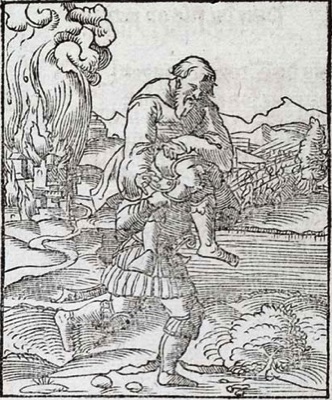End

At that moment, onto the stage comes the young lover and hero, Orlando, carrying on his back his old servant Adam, who is near death. Duke Senior greets them with the words, “Set down your venerable burden,/ And let him feed.” It's a moment that counters Jacques' cynicism and affirms that those nearing death are not alone in their helplessness; rather, they are loved, venerated, and cared for. Jaques has it half-right. The last act of a human life may well be a second childishness, a total dependence on others for nurture and comfort. But maybe that is the last challenge we face, the last stage in our growth as human beings— that ability to relinquish control and allow ourselves to be a venerable burden to those entrusted with our care.
I had a friend who did not want to acknowledge that he was dying because he wanted to be strong for his wife. She did not want to acknowledge that he was dying because she wanted to be strong for him. They both needed permission to let down their guard, so that they could acknowledge where they were and focus on the work of keeping him free from pain and sustaining a sense of meaning and purpose even as the disease took its course. “Letting down their guard” does not do justice to the deep, painful, scary, wonderful opening of their hearts that made their love for one another even richer and more powerful in those final months, weeks, days.
My prayer for those considering an assisted death is that they are able to approach this decision not as an attempt to assert control over the dying process or to unburden their loved ones, but as a last-resort response to unacceptable levels of pain and suffering.
I believe in the right to die, in much the same way I believe that a woman's reproductive rights are between her, her loved ones, and her physicians. There are certainly circumstances in which choosing to die is a natural extension of the essential goals of palliative care and hospice, which are to be free of pain and to sustain a sense of dignity.
But I want to propose a distinction between dignity and control. I worry about Baby Boomers, who are used to getting what they want and being in control, using medical aid in dying as a shortcut. How often have you heard someone say, when talking about the end of life, "I don't want to be a burden." Maybe, being a burden is a gift you give to the loved ones who care for you. Maybe the burden of caring for you will lighten the burden of living without you. That was my experience in caring for my father in his last illness, as recounted in "A Good Day's Work."
In Shakespeare's As You Like It, Jaques, the jaded philosopher and ex-libertine, gives a famous speech on the seven ages of a human life. “All the world's a stage,” he says,
Be a Burden

The sixth age shifts
Into the lean and slippered pantaloon,
With spectacles on nose, and pouch on side,
His youthful hose, well sav'd, a world too wide
For his shrunk shank, and his big manly voice,
Turning again toward childish treble, pipes
And whistles in his sound. Last scene of all,
That ends this strange eventful history,
Is second childishness, and mere oblivion,
Sans teeth, sans eyes, sans every thing.
And all the men and women merely players;
They have their exits and their entrances,
And one man in his time plays many parts,
His acts being seven ages. At first the infant,
Mewling and puking in the nurse's arms....”
As Jaques' meditation unfolds, his air of detached melancholy gives way to a darker shade of cynicism, especially as he describes the last two acts of a human life: